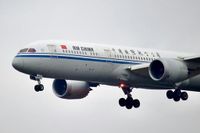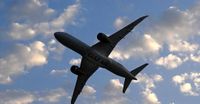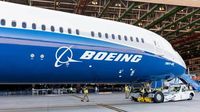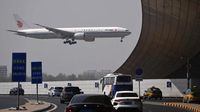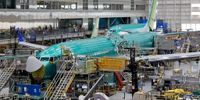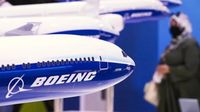In a significant escalation of the ongoing trade conflict between the United States and China, the Chinese government has ordered its airlines to halt the acceptance of new Boeing aircraft deliveries. This decision comes as a direct response to the imposition of steep tariffs by the Trump administration, which have reached as high as 145% on Chinese imports.
According to Bloomberg, this latest move is part of a broader retaliatory strategy by Beijing, which has also instructed its airlines to suspend purchases of aircraft-related equipment and spare parts from U.S. companies. The tariffs imposed by China, which stand at 125%, have effectively doubled the cost of U.S.-manufactured aircraft and parts, making transactions with Boeing economically unfeasible.
As a result of this order, Boeing's stock fell by as much as 2.5% in pre-market trading, reflecting the market's immediate reaction to the news. By April 14, 2025, Boeing's shares had already decreased by 10% for the year, signaling investor concerns over the company's future in a market that has historically been one of its largest.
Currently, around ten Boeing 737 Max aircraft are poised to join the fleets of major Chinese airlines, including China Southern Airlines, Air China, and Xiamen Airlines. Some of these planes are already stationed near Boeing's production facility in Seattle, while others are located at a finishing center in Zhoushan, eastern China. If the payment for these aircraft was completed before the reciprocal tariffs took effect on April 12, 2025, they may still be allowed into China.
This situation poses a substantial challenge for Boeing, which had previously enjoyed a strong foothold in the Chinese market. In 2018, nearly a quarter of Boeing's production was sold to China, and forecasts indicate that the country could account for 20% of global aircraft demand over the next two decades. However, due to the ongoing trade tensions, Boeing has not secured any significant orders from China in recent years.
Analysts suggest that while the cessation of deliveries is manageable for Boeing in the short term, the long-term implications are concerning. "The halt of deliveries to China is not unexpected amid the trade war with the U.S. and should be manageable, given that orders from the country are only a small part of the backlog," stated George Ferguson and Melissa Balzano from Bloomberg Intelligence.
Despite the challenges posed by the trade war, the reliance of Chinese airlines on Boeing aircraft remains significant. Many of these airlines operate fleets that include hundreds of Boeing planes, which will still require maintenance and repair services from the U.S. manufacturer.
In the first quarter of 2025, Boeing delivered 18 aircraft to Chinese airlines, predominantly of the 737 Max model, with most deliveries going to China Southern Airlines. However, no new orders have been reported for this year. The current geopolitical climate has shifted the dynamics of the aviation market, with Airbus emerging as a key competitor. The European manufacturer has been gaining ground in China, and its market share is expected to increase as Boeing's presence wanes.
While Boeing has been forced to navigate these turbulent waters, the Chinese government is also considering ways to support its airlines that lease Boeing aircraft and are now facing higher maintenance costs due to the tariffs. The three major Chinese airlines — Air China, China Eastern Airlines, and China Southern Airlines — had planned to receive 45, 53, and 81 Boeing aircraft, respectively, over the next two years.
In light of the current circumstances, the future of Boeing in China appears increasingly precarious. The company's historical dominance in the market has been challenged by the rise of domestic manufacturers like COMAC, which is developing its own aircraft to compete with Boeing and Airbus.
The COMAC C919, designed and assembled in China, aims to directly rival the Boeing 737 Max and Airbus A320. Although the C919 has yet to achieve significant market penetration, the current trade tensions could accelerate its adoption among Chinese airlines.
As the trade war continues to escalate, both sides remain entrenched in their positions. Trump has indicated a willingness to negotiate, but the Chinese government has made it clear that it will not back down. "Nobody wins in a trade war," they assert, emphasizing the need for a resolution that benefits both parties.
The implications of this trade conflict extend beyond the immediate impact on Boeing and Chinese airlines. The ongoing tariffs threaten to disrupt the entire aviation industry, as both countries leverage their supply chains as tools of negotiation. The long-term effects remain uncertain, but the immediate consequences are already being felt across the sector.
As the situation develops, industry experts and stakeholders will be closely monitoring the potential for an agreement that could alleviate some of the newly imposed barriers to trade. Until then, the aviation sector finds itself caught in the crossfire of two global superpowers vying for economic dominance.
In summary, the order from the Chinese government to halt Boeing aircraft deliveries marks a critical juncture in the ongoing trade conflict. With both sides digging in their heels, the future of Boeing in China hangs in the balance, as does the broader relationship between these two economic giants.
